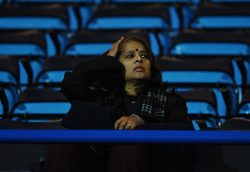Who was the Premier League club owner who confessed to having watched cricket and hockey but never football ? This and other questions about foreign club ownership are answered in a new book reviewed by ERIC BROWN.
Maybe Blackburn Rovers were doomed to struggle from the start under the eccentric leadership of Mrs Anuradha Desai. She was disarmingly honest when on taking the hot seat at Rovers she declared: “I have watched cricket and hockey but never football. I know nothing about football.”

Mrs Desai was head of Venkateshwara Hatcheries of Pune, India, who hit on the idea to widen the global brand of their chicken hatchery company by buying an English Premier League club.
Thus it was that a decade after the death of philanthropic Jack Walker, Rovers were landed with a company clearly possessing more cash than sense when it came to football.
Venky’s were approximately three times richer than dear Jack and at 67 in the top 100 small global companies their turnover was estimated at just over £100million.
Assisting Mrs Desai were brothers Balaji and Venkatash who had 74 motors between them including Rolls Royces, Bentleys and Hummers. Oh and they had six bodyguards too.
At first the family and their riches seemed welcome at Ewood Park with fans anticipating a giant cash infusion and consequent improvement in playing staff and results.
Soon alarm bells began to ring. Mrs Desai’s shock decision to sack manager Sam Allardyce came soon after promising him a modest £5million to spend in the family’s first transfer window as owners. It was all downhill from there.

Maradona, Stuart Pearce and Martin Jol were mentioned as possible successors to Allardyce but Blackburn got Steve Kean who had replaced Karl Robinson in the head coach role.
After just a single game as caretaker, an uninspiring 1-1 draw with West Ham, Kean was named manager and a month after that, with just two wins in six League games, he was given a three year contract.
To put this in context, after his first six games Brian Clough was still painting the stands at Hartlepool and Fergie was wondering if he’d have to play in goal at East Stirling.
The Busbys, Shanklys, Paisleys and Steins did not get three-year contracts until their clubs’ trophy cabinets overflowed. Mrs Desai, it seemed, still had plenty of learning to do.
Keane hardly had time to run the team. He was summoned 14 times to India during his 22 months in charge missing three days training each time.
No wonder Blackburn’s fortunes plummeted. It would be tedious to list all the disasters that befell the club under Indian ownership including relegation.
They can be summed up by saying a glut of disastrous managerial appointments and player signings soon culminated in Rovers fighting to avoid dropping into the third tier.

As tales of foreign club ownership go it’s among the worst discussed in a readable account by Kuala Lumpur-based Bob Holmes, formerly of the London Evening Standard, The Observer and Telegraph.
He delves into other foreign ownership sagas at Portsmouth, Notts County, Hearts, Nottingham Forest, Wolves, Aston Villa and Queens Park Rangers. Not all such ventures end in tears.
He also describes how Chelsea joined England’s top table thanks to the bottomless purse of one Roman Arkadyevich Abramovich.
Mainly though it’s a tale of ignorance and profligacy which may have you tearing out your hair in frustration and disbelief.
Most of all it will leave you wondering what happened to football’s “Fit and Proper” ownership process particularly when one club’s finances were being run by a convicted fraudster.
*Caesars, Saviours and Suckers, the good the bad and the ugly of football’s foreign owners, by Bob Holmes is published by York Publishing, Price £13.99.
- The SJA is the largest member organisation of sports media professionals in the world. Join us: Click here for more details